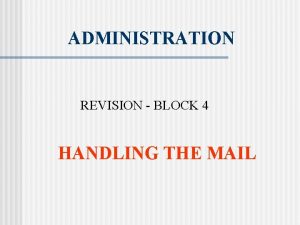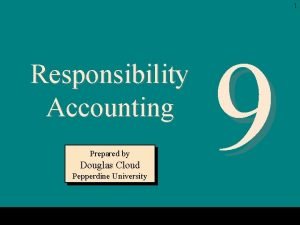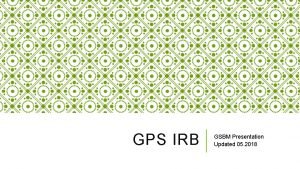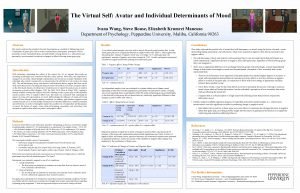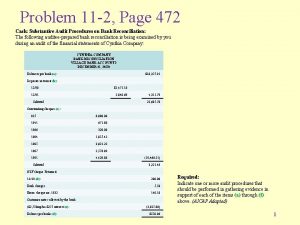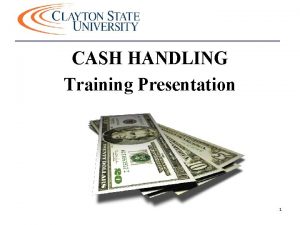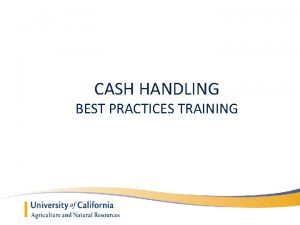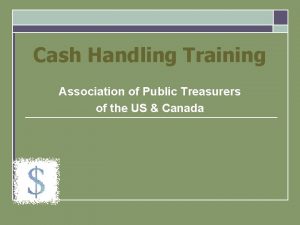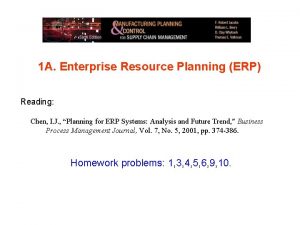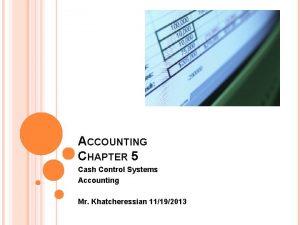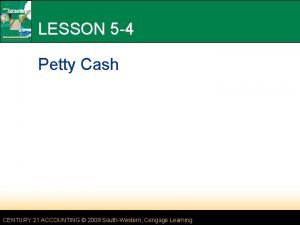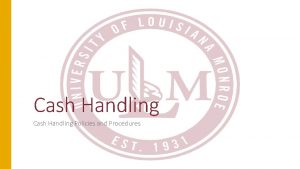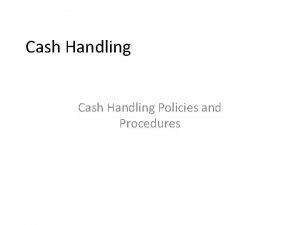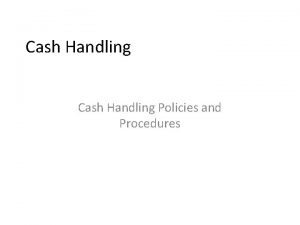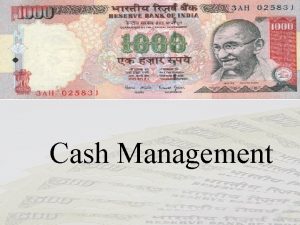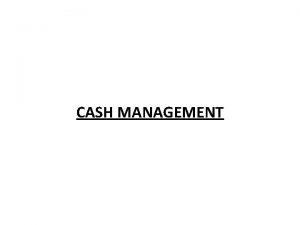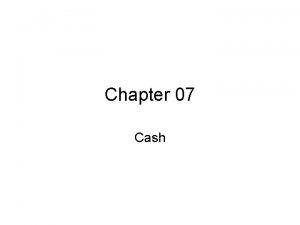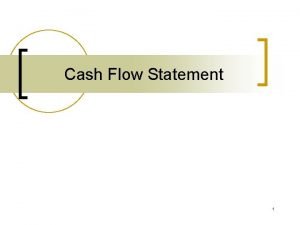Cash Handling Procedures Dont Lose the Lettuce Pepperdine























- Slides: 23

Cash Handling Procedures “Don’t Lose the Lettuce” Pepperdine University Cashier’s Office TAC 2 nd Floor, Malibu x 4107 1

Cash Handling – It’s your job Whether you take in lots of money or…you collect “pennies” 2

……. . the principles of good cash handling are basically the same. • Documentation • Separation of Duties • Security • Reconciliation • Management Review 3

What is “Cash” ? • Coins • Currency • Checks • Personal • Business • Traveler’s • Cashier’s • Money Orders • Credit Cards • Debit Cards • Electronic Payments 4

First, lets talk about risk and controls…. Who or what is at risk? 5

Risk • Cash is stolen • Cash is lost • Lost revenues • No audit trail • Posted to incorrect chartfields • Finger pointing/Accusations/Disciplinary actions • Lost job! 6

Risk and Controls Remember – In the cash collecting process, YOU are just as important as the cash………. . The controls (rules) that we will discuss are designed to protect both YOU and the cash you are handling. 7

Collecting the Cash • How is cash received? • Who is going to collect the cash? • Who will record the cash? 8

Collecting the Cash In Person • The cash received must be entered on a cash register, if one is available, and a copy of the receipt given to the customer. • If a cash register is not available, then create a dual copy receipt, keep one for balancing, and give one to the customer. 9

Collecting the Cash by Mail • Mail should be opened immediately, cash payments identified and logged by the designated person opening the mail. • Receipt log should be provided to staff for satisfying sales orders or posting data to customer records. 10

Separation of Duties • The cash collection point must maintain a clear separation of duties. One individual should not have responsibility for more than one of the cash handling components: – Billing – Collecting/Depositing – Reconciling 11

Separation of Duties • The individual who receipts payments should not: – Be able to reverse payments (reversals should require supervisory override). – Be able to adjust charges on the student account or general ledger. 12

“Now that we have collected the cash, what do we do with it? ” • Secure • Balance • Deposit • Reconcile 13

How is cash going to be secured? • Cash must be physically protected from loss at all times. Lockable receptacles, with key control and restricted access, must be used. • Amounts exceeding $1, 500 must be in a fire resistant safe. 14

How is cash going to be secured? While in Use… • If making change is necessary, each person collecting cash should have a cash box or drawer that no one else uses. When not in Use… • Secure the cash box in a locked drawer and limit access. • Secure the cash drawer by locking it and limiting access. 15

Balancing • Every day, all cash receipts must be balanced. • Compare the cash (currency, coin, checks, credit card receipts, etc. ) to the records (cash register tapes, receipt copies, sales logs etc. ) • Identify and resolve any discrepancies. 16

Depositing to Cashier’s Office • A Cash Custodian is responsible for the daily deposits of the department. • All deposits must be delivered in a locked cash bag or sealed plastic bag provided by the Cashier’s Office. • The locked cash bag with receipts will be returned or ready for pick-up the next business day. 17

Preparing the Deposit • All deposits must be prepared using the Cashier’s Office deposit forms. • Any individual check for $25, 000 or more requires a separate Deposit Form and immediate notification to the Cashier’s Office. 18

When To Deposit • All deposits must be delivered daily, to the Cashier’s Office. • A second deposit may be required, before the close of business, whenever the sum of $500 or more is accumulated. 19

Reconciliation • Verify that all transactions are complete and recorded. 20

Cash Custodian Responsibilities • Have clear written procedures for cash handling and cashiering functions. • Establish an effective internal control system. • Delegate responsibility for cash handling, while maintaining proper segregation of duties. • Require that staff who handle cash be properly trained and that they follow all of the University’s Cash Handling Policies and Cash Control Procedures. 21

Management Responsibilities • Review reconciliation on a regular basis, then sign & date documentation review. • Prepare and review monthly overage/shortage reports. Look for both frequency and amounts of outage. • No matter who is collecting, depositing, and reconciling cash, management is ultimately accountable. 22

Cash Handling Procedures The End 23
 Habit 4 think win win examples
Habit 4 think win win examples Win win win lose lose lose
Win win win lose lose lose Win-win win-lose lose-lose
Win-win win-lose lose-lose Dont laugh at me dont call me names
Dont laugh at me dont call me names Dont ask dont tell political cartoon
Dont ask dont tell political cartoon Win lose attitude
Win lose attitude Win-win conflict resolution
Win-win conflict resolution Pigeon mail merge
Pigeon mail merge Don thompson pepperdine
Don thompson pepperdine Pepperdine accounting
Pepperdine accounting Eprotoco
Eprotoco Andrea harris pepperdine
Andrea harris pepperdine Don thompson pepperdine
Don thompson pepperdine Steve rouse pepperdine
Steve rouse pepperdine Substantive audit procedures for cash
Substantive audit procedures for cash Cash handling training
Cash handling training Retail cash handling best practices
Retail cash handling best practices Cash handling certification
Cash handling certification Cash to cash cycle time
Cash to cash cycle time Chapter 5 cash control systems
Chapter 5 cash control systems Cash-in cash-out
Cash-in cash-out Operating budget example
Operating budget example Cash to cash cycle time
Cash to cash cycle time Paid cash to replenish the petty cash fund
Paid cash to replenish the petty cash fund







